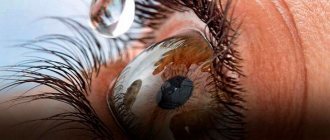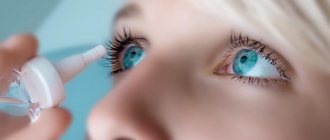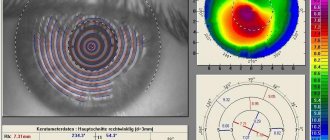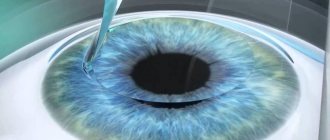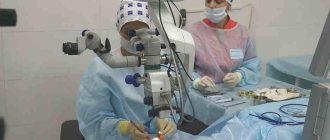Laser correction is a modern way to solve the problem of myopia and hypermetropia. The procedure is an alternative for people who do not want to spend their lives with glasses and contacts.
Correction has a high cost, so some patients are forced to postpone it, saving money. In addition, people are afraid to undergo surgery. They do not know what consequences await them and the time frame for vision restoration after laser correction; they do not want to lose their ability to work for a long time.
Why do patients postpone laser correction?
If we compare the price of the procedure and the cost of contact lenses per year, the benefit shifts towards surgical intervention. But people suffering from visual impairments have other fears that prevent them from taking drastic measures:
- Thoughts that vision will not be fully restored. Before prescribing each operation, doctors diagnose the condition of the patient’s visual apparatus. Correction of myopia is not prescribed for readings above -15 diopters, and for farsightedness above +5. High-grade disorders are treated with surgery, such as phakic lens implantation.
- The patient is afraid that vision will not be restored for long. Indeed, if you constantly expose your eyes to a lot of stress, read in darkened rooms and in an uncomfortable position, or spend days on end at the computer, your vision may deteriorate again. But the experience gained will teach a person to be more careful about his eyes.
- Fear of long vision recovery after laser correction. People mistakenly imagine that after the procedure they will have to undergo a long course of rehabilitation, dressings and therapy. In fact, the eyes will regain their visual acuity within 2-24 hours after the intervention. A little more time will be needed for the rehabilitation period.
Instructions for patients undergoing laser vision correction surgery
MEMO FOR PATIENTS FOR LASER VISION CORRECTION OPERATION
Laser vision correction TENEO -2 excimer laser in Germany) , which allows you to obtain high-definition vision ( HD vision). The selection of a laser correction program occurs individually for each patient after a diagnostic examination.
Laser correction programs
* Lasik HD – a program for the correction of myopia, hypermetropia, astigmatism (the cost of the operation depends on the degree of visual impairment).
* LASIK HD ECO Mode is a tissue-preserving vision correction program for thin corneas.
* Lasik HD Supracor is a unique presbyopia correction program.
* PRK HD – performed if there are contraindications to LASIK surgery.
general information.
* Preoperative examination (no additional charge) takes place 1-2 days before surgery. You can ask the surgeon all the questions you are interested in and then sign the “Consent to Surgery” . This must be done in accordance with the Russian Federation Law “On the Protection of Citizens’ Health.”
* Control inspection (no additional charge) is carried out the next day. Nonresident patients can go home after a follow-up examination.
* All subsequent examinations at the clinic are carried out as prescribed by the doctor, by appointment and are paid according to the current price list: up to 6 months after the operation - 750 rubles; after 6 months from the date of surgery – 1550 rubles.
* A certificate of incapacity for work is issued from the day of surgery (for 2 days); students and employees - a certificate of the established form (for 2 days). Exemption from physical education and going to the gym is issued for 14 days. To apply for a certificate of incapacity for work, you need to bring your passport and SNILS.
How to prepare for surgery:
- Do not wear soft contact lenses for 14 days, hard lenses for 30 days . You can wear glasses. All this time, until the day of surgery, you need to instill moisturizing drops (HILO-KOMOD, THEALOS or OXYAL) 3 times a day. Purchase the drops yourself.
- Remove eyelash extensions.
- On the day of surgery, thoroughly wash your face and hair, take a shower, and do not use makeup, perfume, cologne, or hairspray.
- Do not drink alcoholic beverages (2 days before surgery and 2 days after surgery) .
- You need to eat 1.5-2 hours before surgery . Bring sunglasses with you . Wear comfortable clothes (the operation is performed in a supine position).
Operation:
- The operation is performed on an outpatient basis, under local anesthesia (you will be given anesthetic eye drops). Operation time 10 minutes. You will be examined by a doctor 30 minutes after the operation.
- During the operation , try to carefully and calmly follow the surgeon's instructions. You will feel a slight pressure on the eye and hear the noise of the devices.
After operation:
- Within 3-4 hours, there may be profuse lacrimation, photophobia, a feeling of “sand”, “burning” in the eyes, redness of the eyes, “fog” in the eyes, slight pain when blinking. You must wear sunglasses and wear them for the rest of the day. You need to take the eye drops they give you and get more rest. Wipe tears on your cheeks without touching your eyes with the napkin. The food is ordinary. Do not smoke, avoid getting smoke in your eyes. For eye pain, you can take 1 painkiller tablet.
- The next day you need to: Wash your face carefully. Arrive at the clinic at the appointed time for a follow-up examination wearing sunglasses. Continue adding drops. Avoid driving, working on a computer, or playing sports on this day. Avoid smoky rooms. Do not visit the sauna or bathhouse. You can watch TV for 1-2 hours or work on the computer. You can walk outside for 1-2 hours.
Attention!
After laser correction, the eyes adapt and tears normalize for 3-6 months.
Don't worry if you experience the following symptoms:
- Fluctuations in distance and near visual acuity at different times of the day.
- Foggy, blurred vision.
- Dry eyes, feeling of “sand”, specks in the eyes.
- Double image.
- Increased sensitivity to light in the evening and at night.
- Different visual acuity of the right and left eyes.
- Tired eyes, especially towards the end of the day.
All these symptoms will gradually disappear! It is necessary to continue to instill moisturizing drops and follow the following recommendations:
- From the 3rd to the 15th day after surgery: You can read, work on the computer, watch TV, but you need to take breaks more often and rest your eyes. You can drive a car and fly on an airplane. Sexual activity is possible, but avoid touching your eyes. When playing with children, be careful not to hurt their eyes. These days you cannot apply eye makeup, eyelash extensions, or visit baths, saunas, swimming pools, or solariums. When washing your face and hair, avoid getting soap and shampoo in your eyes. Avoid active sports and lifting weights greater than 15 kg.
- Up to 3-6 months after surgery: You can play sports, but try to avoid accidental eye injury while playing contact sports (boxing, karate, volleyball, basketball, etc.) Try not to plan a pregnancy during this period.
Correct behavior during surgery
and compliance with our recommendations after surgery -
the key to your good vision.
LOOK AT THE WORLD WITH PLEASURE!
Preparing for surgery
Laser vision correction is not the most complicated eye surgery, but it requires attentiveness, a steady hand and excellent knowledge from the doctor. Before prescribing the procedure, the medical professional will examine the patient for contraindications. These operations are not prescribed for minors, pregnant women, women during lactation, persons suffering from cancer, diabetes mellitus, and other eye diseases.
There are several treatment methods. Already at the first appointment, the doctor will select the most appropriate one. The time frame for vision restoration after laser correction also depends on the chosen technique. As before any operation, before vision correction it is required to undergo fluorography, blood and urine tests. The patient also needs to draw up and sign a consent to undergo surgery in the selected clinic.
Contraindications for laser vision correction
Before entering the operating room to correct refractive errors, the patient undergoes a comprehensive visual examination and blood tests. If there are changes in the cornea, pathology of the retina or some general diseases, the operation will be refused.
Limitations and contraindications for laser vision correction are determined by general and ocular pathologies:
- high degree of myopia (over -10 D). This indicator is conditional, since with a thin cornea the patient can expect failure even with a lesser degree of myopia, and with a relatively thick cornea, the refractive surgeon will have the opportunity to “remove” a larger number of diopters;
- high degree of farsightedness (over +6 D);
- high degree of astigmatism (more than 5 D);
- unstable, progressive myopia, confirmed objectively;
- pathological changes in the cornea (scars, keratoconus and keratoglobus diseases, opacities, dystrophies, etc.);
- uveitis;
- infectious diseases of other organs;
- severe retinopathy (diabetic, postthrombotic, etc.);
- optic nerve atrophy;
- severe dry eye syndrome;
- minors (under 18 years of age). This contraindication to laser vision correction can be canceled if the myopia is stable;
- neuropsychiatric disorders;
- rhythmic movements of the eyeballs - nystagmus;
- pregnancy and breastfeeding;
- autoimmune diseases in the acute stage - lupus erythematosus, rheumatoid polyarthritis, systemic scleroderma, etc.
A contraindication for laser vision correction for a patient will also be the only seeing eye.
In addition to the above, there are a number of relative restrictions. These are those diseases or conditions for which surgery is, in principle, possible, but after the acute period has stopped or the process has stabilized.
Relative contraindications for laser vision correction:
- phenomena of inflammation in the anterior segment - viral keratitis and its consequences, conjunctivitis;
- congenital cataract;
- uncompensated glaucoma;
- condition after surgical treatment of retinal detachment;
- general chronic diseases - diabetes, rheumatism, etc.
Relative limitations of laser vision correction also include the small anteroposterior size of the eyeball, deep-set eyes, small corneal diameter (less than 10 mm) and pronounced deviations in diopter power (more than 49 or less than 39 D).
The decision on the possibility and advisability of surgery in the presence of relative contraindications for laser correction is made by a refractive surgeon.
Tips and recommendations before the procedure
Preparations are also required from the patient. There is a list of recommendations and instructions that will help you conduct the event comfortably, without unnecessary stress.
- The day before the operation you should not drink alcohol.
- On the day of the procedure, it is not recommended to apply makeup, use perfumes, lotions, varnishes, or aerosol deodorants.
- Doctors advise stopping using contact lenses 1-2 weeks before correction.
- For surgery, it is advisable to wear breathable clothing with a wide collar.
- When going to the hospital, the patient needs to take eye drops, if the ophthalmologist has already prescribed them, and sunglasses. Immediately after the manipulation, the eyes will be very sensitive to bright light.
- It is recommended to take an accompanying person with you, since for some time after the restoration of vision with laser correction, the patient will experience fog before the eyes.
Recovery time
The initial restoration of vision after laser correction surgery takes up to 2 hours; it is advisable to spend this time in the clinic under the supervision of a specialist. Afterwards, the patient is ready to return home; theoretically, he can drive a vehicle, but there may be discomfort, burning, and fog in the eyes. Therefore, in practice, driving a vehicle after correction is not recommended.
Complete restoration of vision after laser correction Femto-LASIK and LASIK lasts 24 hours. A more traumatic LASEK technique. After it, recovery is 3-5 days. All indicators are individual and depend on the type of correction and the condition of the visual organs. The average rate of complete healing is 1-3 months.
Types of laser correction techniques and timing
There are several types of laser surgeries.
- Photorefractive keratectomy (PRK) is the first and oldest technique for correcting myopia and farsightedness. The recovery period for vision after laser correction of this type is up to 4 days, and rehabilitation is 3-4 weeks. A protective lens is used to shorten the period. This method is used only if other methods are contraindicated.
- LASEK is a more modern modification of PRK; its advantages are that it allows both eyes to be operated on in one procedure, and is also suitable for patients with thin corneas. Recovery time is shorter than with keratectomy, up to 3 days
- LASIK is the most popular procedure at the moment. Numerous positive reviews about vision restoration after laser correction using this technique confirm that visual acuity is restored within a few hours after the manipulations. The peculiarity of this operation is that the laser leaves the surface layers of the cornea intact, and evaporates only the middle layers of tissue. To do this, the upper flap is cut and bent to the side, and after the procedure is completed, it returns to the place where the epithelium is restored independently.
- Femto-LASIK differs from the conventional LASIK technique in the process of creating a corneal flap. A femtolaser is used to cut it.
How vision is restored after laser correction
Deciding on laser correction is not easy. Mainly because there are a lot of unknowns and fears - what if? Is it possible? Therefore, in our articles we answer basic questions in order to dispel myths and provide accurate information. Today's topic is how eyes heal after laser correction.
Let's first clarify how LASIK surgery works.
- The doctor creates a flap from the superficial tissues of the cornea.
- This flap is folded back with a laser.
- The laser corrects the shape of the cornea.
- The flap comes back.
That is, in fact, all healing is how quickly the corneal flap “grows” back. After this, a process of recovery and adaptation must go through, as the brain needs to adapt to the new vision. But healing begins already in the operating room.
Stage 1: first minutes in the operating room
The patient sees clearly in the first minutes after the operation. You shouldn't go home right away. After a few hours, the doctor examines you and sends you home.
An important point: visual acuity is restored immediately after the operation. Usually at this moment a person may experience the sensation of a “dry eye”, a speck in the eye. After the operation, he is asked to rest in the clinic for at least two hours.
Stage 2: first two hours in the clinic
The ability of our cornea to recover is unique - the flap “sticks” with the help of collagen, which cosmetic companies praise so much. An important role here is played by its adhesiveness - that is, stickiness. The corneal flap is detached on one side only; after correction, it instantly returns to its place. It is the same thickness everywhere, which makes healing easier.
In fact, after two hours of active collagen intervention, the flap is already back in place. But we still do not recommend driving and ask that the patient be met by someone from the clinic and escorted home. From this moment, more global tissue restoration begins.
Stage 3: first days after surgery
For the first few days, you should protect your eyes from any stress. This will help you return to your normal lifestyle within a week.
The main discomfort that is possible after surgery comes and goes away within a few days. To be on the safe side, we advise patients not to plan any important activities in the first week after surgery. Ideally: spend less time outdoors and in damp rooms - do not swim, do not dive, and only go out in the sun wearing glasses with a good UV filter.
What complications can occur immediately after laser correction?
- "Dry eye syndrome." The laser beam, despite the fact that it practically does not penetrate the tissue, still causes a burn to the cornea. Therefore, immediately after surgery, patients may experience a lot of tears, but then, on the contrary, their deficiency occurs. Therefore, the process when the eye dries out after correction is completely natural and goes away within a day.
- Redness. May occur due to micro-ruptures of blood vessels. It goes away within a few days.
- Itching in the eyes. It goes away within a day.
- Edema. Goes away 12-18 hours after surgery.
- Foggy, blurry vision. This is also a variant of the norm and goes away after a few hours.
Stage 4: first weeks after surgery
Girls should wait a while with make-up. And for men it is better to postpone training in football, hockey or boxing for a couple of months.
After the first week, you can safely sit at the computer and drive a car, but still with restrictions. After correction, night vision is restored more slowly than day vision, which is why some people see halos around streetlights and car headlights. To prevent this from disorienting you on the road, we advise you to avoid night driving in the first weeks.
It is worth limiting serious loads for a week or two. As well as the sauna, and fitness, and cosmetics, and any beauty practices before the eyes.
The situation with contact sports is a little more complicated. In the first six months, there is a risk of damaging the flap due to a strong impact.
Stage 5: complete recovery
After a few months (usually up to six months), the tissues are completely restored. Your doctor will tell you about your full recovery during your regular check-up. After this, you can enjoy your renewed vision. The only question that usually worries people at this stage is what if, after some time after correction, vision deteriorates?
If you treat your vision responsibly, it will not fall until natural presbyopia (age-related farsightedness) sets in - no correction can yet avoid it. Do not forget that the eyes need rest, exercise and careful treatment. In this case, both the recovery and the future life of your eyes will be wonderful.
Recommendations after surgery
In order for the operated person to quickly resume normal life and get rid of discomfort in the eyes, he should follow the doctor’s instructions. Rehabilitation of the visual organs takes, on average, one week. The patient should follow these recommendations:
- For 3 days after correction, it is not recommended to sleep on your stomach and side; this will protect the visual organ from possible damage.
- Do not touch your eyes with your hands or other foreign objects or rub them.
- After the operation, it is not recommended to wash your hair for 3-4 days, or make sure that the shampoo does not get into your eyes. You should wash your face carefully, avoiding the area around the eyes.
- During the recovery period after laser vision correction, avoiding alcohol is mandatory. It can contribute to dehydration of the corneal surface.
- The patient is required to temporarily stop smoking and avoid smoky places.
- It is not recommended to stay in the sun, and if necessary, always use sunglasses while your eyes are susceptible to photophobia.
- In order to prevent infection, visits to the pool, sauna, and bathhouse should be postponed.
- You cannot engage in active or traumatic sports, lifting or moving loads.
- The eyes and brain need to adapt to new visual information. For the first 2 months, you don’t need to overload your eyes with reading and working at the computer; be sure to take breaks.
- Women should refrain from using decorative cosmetics, spraying perfumes and varnishes near the eyes, and eyelash extensions.
Laser vision correction: after surgery
With these pathologies, the light beam is not fixed at a certain point on the retina, so the image appears blurry. Using the Lasik technique, the doctor changes the refractive power of the eyes. The picture becomes clear again.
To perform the operation, our specialists use advanced high-precision equipment: microlamellar turbokerat and ophthalmic excimer laser. The patient should first undergo tests, and on the day of the procedure, wash his hair and face; there should be no makeup. First, anesthesia is administered by instilling special drops into the eyes. The eye is fixed open by installing an eyelid dilator, which prevents involuntary blinking.
Using a microkerator, the doctor peels off and folds the surface layer of the cornea. Then it begins to influence the deeper layers with an excimer laser. They partially evaporate and a new shape of the cornea is created. Using collagen, the surgeon fixes the previously detached flap. Thanks to this, healing occurs faster and the overall effect improves. At the final stage, the cornea is washed with a special solution. During the operation, minimal incisions are made and no stitches are applied.
Benefits of Lasik for low vision patients:
- the operation is low-traumatic and painless;
- eliminates the need to wear glasses or contacts;
- duration – no more than 10-15 minutes;
- vision improves immediately, and the recovery period is minimal and does not require adjustments to your usual lifestyle.
Despite the advantages of the procedure, laser vision correction is not suitable for all cases. Patients at the Oculus Clinic are first given a comprehensive eye examination to clarify the diagnosis and identify contraindications, and tests are prescribed. The surgeon then makes a decision on whether the operation is advisable.
Indications and contraindications
During Lasik surgery, myopia is eliminated up to -15.0 diopters, farsightedness up to +6 diopters, astigmatism up to ± 3.0 diopters. However, age-related farsightedness cannot be corrected using this method.
Absolute contraindications:
- autoimmune pathologies (collagenosis, arthritis);
- immunodeficiency states;
- systemic pathologies that disrupt tissue healing processes;
- installed pacemaker.
- From the eyes:
- thinning of the cornea (thickness less than 450 (440) microns);
- glaucoma;
- progressive myopia;
- keratoconus;
- herpes simplex virus;
- shingles.
Relative contraindications:
- pregnancy and lactation, including six months after it (hormonal changes occur);
- endogenous psychoses;
- penetrating scars and severe corneal opacity;
- inflammation of the parts of the eye, lacrimal apparatus;
- significant changes in the fundus.
In case of retinal lesions, when prophylactic laser coagulation is necessary, the operation is postponed.
Features of the recovery period
Post- Lasik recovery period
minimum. You can go to work and drive the very next day. However, we recommend taking a couple of days off.
Complete rehabilitation takes from 1 to 3 months. During this time, the refractive effect finally stabilizes. Vision improves significantly 2-4 hours after laser correction, although slight blurriness is possible in the first day. It usually goes away the next morning. Vision reaches its maximum acuity within a few weeks.
At first, the patient may be concerned about side effects:
- tearing eyes;
- sensitivity to light;
- sensation of a foreign body in the eye;
- dilated pupils;
- swelling of the eyelids;
- flickering of flies or spots before the eyes.
These are temporary symptoms that are not dangerous and go away on their own.
Limitations after Lasik vision correction
The patient should instill drops into the eyes every 2-3 hours for 3 weeks. If pain occurs, you can take painkillers, although it usually goes away on its own within 3-4 hours after surgery. Since your eyes will be very sensitive to light at first, you will need to wear sunglasses. They will also protect from dust on the street.
You must also observe the following restrictions after L asik
:
- Avoid touching your eyelids and eyes. If tears appear, gently blot them from the cheeks only.
- Do not use eye washes. If you need to clean them, take gauze soaked in cool boiled water.
- Limit your intake of spicy, fatty, sweet and liquid foods.
- Keep shower gels, soaps, shampoos and other cleaning products away from your eyes.
- Do not sunbathe in a solarium, do not swim in a pool, and avoid intense physical activity.
- Avoid alcohol.
- Avoid smoking and being in smoky places.
It is important to control visual stress. It is forbidden to make sudden movements with the eyes, rub them, put pressure on them, or squeeze the eyelids tightly. It is not recommended to read or watch TV for a long time. When working at a computer, be sure to take 15-minute breaks every 45 minutes of sitting at the monitor.
The next morning after the procedure, you need to go to the doctor for examination. He will give individual recommendations and issue an extract.
Special instructions for women
Women are not recommended to wear makeup after surgery, as rubbing their eyes is prohibited. After 2 weeks, you can resume using skin products - creams, blush, correctors, just try not to apply them close to your eyes. It is recommended to apply mascara to your eyelashes no earlier than every month. Also make sure that cosmetics do not get into your eyes. If this does happen, rinse with plain water and do not use makeup removers.
You should not plan to conceive for 3 months after Lasik surgery. When the cornea is completely restored, there will be no contraindications to pregnancy.
Medical observation
During the period of vision restoration after laser correction, the patient needs to visit the ophthalmologist’s office several times.
The day after the procedure, the operated person must come for an examination. If necessary, he will be scheduled for several more control vision tests.
To protect the eyes from infection, a healthcare professional prescribes drops. They must be instilled strictly according to the instructions; increasing the dose is not allowed. When instilling, you must ensure that the nose of the vial does not come into contact with any surfaces, including the cornea of the eye.
After the LASEK procedure, a bandage lens is applied to the operated eye; its function is to protect the cornea from contact with the external environment and to reduce pain. After 4 days, the lens is removed in the clinic.
If the patient experiences pain and burning sensations in the first three days, he can take painkillers. If the pain does not subside, it is recommended that he consult a specialist.
Possible complications
Despite the fact that only 2% of all laser corrections performed are accompanied by complications, the likelihood of their occurrence cannot be discounted. The following complications may occur:
- Swelling and redness of the mucous membranes of the eyes.
- Infectious inflammations.
- Allergy to the drugs used. The patient must inform before the procedure what medications he is experiencing an allergic reaction to.
- Retinal detachment.
